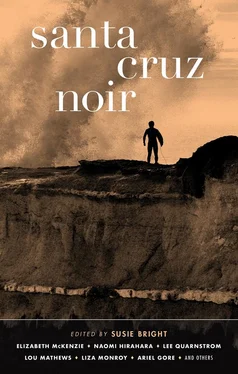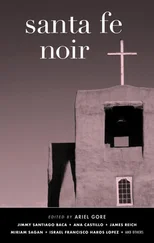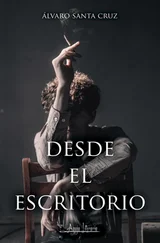Naomi Hirahara - Santa Cruz Noir
Здесь есть возможность читать онлайн «Naomi Hirahara - Santa Cruz Noir» весь текст электронной книги совершенно бесплатно (целиком полную версию без сокращений). В некоторых случаях можно слушать аудио, скачать через торрент в формате fb2 и присутствует краткое содержание. Город: New York, Год выпуска: 2018, ISBN: 2018, Издательство: Akashic Books, Жанр: Детектив, на английском языке. Описание произведения, (предисловие) а так же отзывы посетителей доступны на портале библиотеки ЛибКат.
- Название:Santa Cruz Noir
- Автор:
- Издательство:Akashic Books
- Жанр:
- Год:2018
- Город:New York
- ISBN:978-1-61775-622-1
- Рейтинг книги:5 / 5. Голосов: 1
-
Избранное:Добавить в избранное
- Отзывы:
-
Ваша оценка:
- 100
- 1
- 2
- 3
- 4
- 5
Santa Cruz Noir: краткое содержание, описание и аннотация
Предлагаем к чтению аннотацию, описание, краткое содержание или предисловие (зависит от того, что написал сам автор книги «Santa Cruz Noir»). Если вы не нашли необходимую информацию о книге — напишите в комментариях, мы постараемся отыскать её.
Santa Cruz Noir — читать онлайн бесплатно полную книгу (весь текст) целиком
Ниже представлен текст книги, разбитый по страницам. Система сохранения места последней прочитанной страницы, позволяет с удобством читать онлайн бесплатно книгу «Santa Cruz Noir», без необходимости каждый раз заново искать на чём Вы остановились. Поставьте закладку, и сможете в любой момент перейти на страницу, на которой закончили чтение.
Интервал:
Закладка:
Bear Creek Road
I walk from my classroom at San Jose City College to the faculty lot, my coat draped over my elbow, tote bags full of papers that need grading slung on each shoulder, my hands gripping my dinner leftovers and an invitation to a union picnic. I don’t have a hand free to pull up the worn waistband of my skirt, which keeps falling down lower and lower on my hips. Dim amber lights illuminate the fog that trolled in while I was teaching my evening class. My white car is a smudge in a far corner of the lot, now, at 9:45 p.m., nearly empty.
I cut diagonally toward my car and hear the voice of my student Frank Gonzalo yell, “Miss! Doctor — Profess — Miss Janet—” His arms pump back and forth as he walks toward me.
Frank has missed the last two weeks of class, and his essay is late. He’s a tall man in his forties with a doughy face. He is wearing a shiny short-sleeved shirt printed with flames and skulls, and he smells of Bleu de Chanel. He brandishes a rolled-up piece of paper.
“My essay!” he says. He is out of breath. “Here, I’ll help you to your car.” He takes my leftover dinner and one of my bags and hands me his paper.
I pull up my sagging skirt as we walk. I have been teaching since 8 a.m., starting with two morning classes at Cabrillo College with its Monterey Bay views, then an afternoon class at West Valley College in Saratoga where every student drives a Benz — and, finally, ending my day at San Jose City College, flanked on one side by the freeway and on the other, an emergency room. I am hoping to get home to Ben Lomond with an hour or so of time to myself to shower and read before going to bed.
“You’ve missed a lot of classes,” I say. After his last paper, I’d hoped he wasn’t coming back.
“It’s my stomach. I have a note from the doctor. He says I have an ulcer. I have to keep, you know...” he lowers his voice to a whisper, “going to the bathroom.”
A motorcycle screeches past on Moorpark, the four-laner that divides the college from Highway 280.
“You can’t miss any more classes, okay? Or I have to drop you.” I fish my keys from the bottom of a bag of papers and open my car.
“I need to pass,” he says. “It’s—” again he whispers, “my probation officer. She wants me in school.”
His first essay was about his probation officer who, he wrote, was “always in all of my business.” She even stopped by his house sometimes unannounced. He ended his paper by saying he was in school to be an inspiration for his nieces and nephews and to earn a good living to “support his lady.”
“You need to come to class to pass.”
An airplane bellows overhead, descending toward the airport. Frank hovers so close I think for a moment that he might be planning to get into my car. He is very tall. I am eye level with a skull on his shirt, a flame burning in its mouth.
“No, no, you see, you don’t understand.” He gestures to his belly. “I’m not feeling very well. But I need to pass. And my group, you know, they still require a lot from me.”
Frank’s “group” is one of the major gangs — he hasn’t told me which one. His “group” was the topic of his second essay, a wandering mess describing his position of leadership. He is busy with a full-time job as a bouncer at a club downtown, and he said he was trying to get out of his gang but he still had to give them money and help run meetings. He made being in a gang sound boring, like serving on the board of a neighborhood association, except that in his conclusion he said he’d “hurt a lot of people.”
I tuck my bags into the back of the car, next to stacks of papers from my other classes. Frank’s cologne lingers.
“I need to go. It’s late.”
“Don’t drop me,” he says. “Read my paper. I was more descriptive, like you said we should be.”
I settle into the driver’s seat and close the door. He says something I don’t hear. He smiles and waves as I pull away.
To avoid the late-night construction on Highway 17, I take the hairpin turns of Bear Creek Road home to Ben Lomond. I’m tailgated most of the way by a car so close behind me that all I can see are its brights. I can’t make out the turnouts on the unlit road. Just after the Summit, the tailgater turns off, and I’m left alone in the darkness to muddle my way home. I pass a pile of car parts in a driveway. To my right are steep drops. It would be so easy to miscalculate a curve and drive right off.
When I get home, I turn on the space heater in my one-room rental and change out of the clothes I’ve been wearing since dawn. It’s only October but starting to get cold already. I look through my half-fridge for something to eat. Last night’s dinner and this morning’s breakfast dishes are piled in the sink; a dirty pan sits on the hotplate with a crust of pasta starch and rancid oil shimmering under the overhead light.
My landlord’s house is dark. He’s gone away on a vision quest with his shaman and won’t be back until Thanksgiving. I’m by myself on his six-acre property, up a long gravel driveway above Love Creek. The nearest neighbors are a mother and daughter who breed Burmese cats. The lights of their cabin are visible in the distance through the forest. I have never stayed for any length of time in a place this isolated before. The aloneness has taken on a heavy quality.
I make toast while I sort through the papers from the five classes I taught today. I unroll Frank’s paper, conscientiously stapled on the right-hand corner, his name typed on the first page, and a centered title, “My Life.” The assignment asked students to write about a single decision that changed their lives — not their entire lives — but he begins, “I was born in San Jose. The son of two parents a single mother and a father which was absent mostly.” I am about to check on my toast when I see the word “bleeding” near the bottom of the first page.
The guy was part of another group and he was talking about stuff and in some faces of some individuals whom he shouldn’t be. He got stabbed bad he was critical bleeding internal in his organs one guys kicked him hard in the stomach with its big boot now pray to god for mercy because stabbed him.
I read the sentences again. They are set in a paragraph about the “group.” The next paragraph is about going to church and how God can “transform everything unto something better.” Smoke wafts from the toast that is now burning in the toaster oven. I unplug it and look again at the paper. On the last page, he writes in his conclusion, “I had done a lot of things in my life. I’m am changing who I am and what I’m going to be.”
I look again at “pray to god for mercy because stabbed him.” He has left out the personal pronoun that should precede the word, “stabbed,” but obviously, someone was stabbed by someone. I make another piece of toast and get into bed.
The quiet in my house is so loud, I put earplugs in to muffle it. My bed is cold as dirt. I turn and face the wall and think, Because stabbed him. I see a young man, maybe twenty-five, the age of my daughter Zia, bleeding, too hurt to even beg for his life, being kicked. And Frank — maybe this stabber — standing there, watching. I will need to report the paper to someone in the morning. The campus police, perhaps the dean.
My alarm goes off at six. I’m exhausted and can’t imagine teaching “citation” in my morning English 1A at Cabrillo. The more tired I am in class, the more my students tend to slip away from me, into their phones, or wherever it is they go in the space they stare at, when I call their names. It will be another day where I won’t be able to hold their attention. I still owe them grades on papers they turned in two weeks ago.
Читать дальшеИнтервал:
Закладка:
Похожие книги на «Santa Cruz Noir»
Представляем Вашему вниманию похожие книги на «Santa Cruz Noir» списком для выбора. Мы отобрали схожую по названию и смыслу литературу в надежде предоставить читателям больше вариантов отыскать новые, интересные, ещё непрочитанные произведения.
Обсуждение, отзывы о книге «Santa Cruz Noir» и просто собственные мнения читателей. Оставьте ваши комментарии, напишите, что Вы думаете о произведении, его смысле или главных героях. Укажите что конкретно понравилось, а что нет, и почему Вы так считаете.











